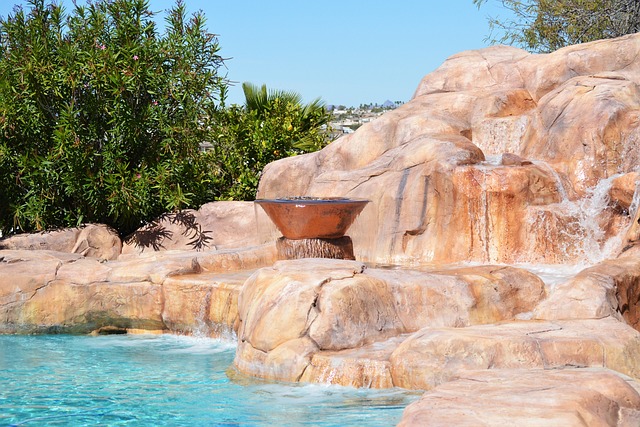The trend towards sustainable backyard design is gaining traction as homeowners embrace eco-friendly landscaping to minimize environmental impact. Green backyard ideas, like drought-tolerant landscaping with native plants, permaculture design, and backyard composting, promote water conservation, support local wildlife, and reduce waste. These water-efficient backyard features not only benefit the planet but also create low-maintenance, beautiful outdoor spaces while contributing to a more sustainable future.
In today’s digital era, the shift towards sustainable living extends even to our backyards. As folks seek to create vibrant, green spaces, embracing eco-friendly landscaping offers a game-changer for both the environment and personal gardens. This article explores the growing demand for green spaces and their environmental impact, delving into various techniques like native plant and drought-tolerant landscaping, permaculture design, and water conservation methods. Discover practical steps to transform your backyard into a sustainable oasis, fostering biodiversity while minimizing environmental footprint, all while enjoying the beauty of nature right at home.
The Shift Towards Sustainable Backyards
In recent years, there’s been a growing movement towards creating sustainable backyards that embrace eco-friendly landscaping. This shift is driven by a desire to minimize environmental impact and contribute to a greener planet. Traditional landscaping practices often rely heavily on water-intensive plants and non-biodegradable materials, leading to increased strain on local resources and ecosystems. However, green backyard ideas are gaining popularity as people seek drought-tolerant landscaping options that require less maintenance and conserve precious water.
Native plant landscaping is at the forefront of this movement, promoting the use of plants naturally adapted to local conditions. This approach not only conserves water but also provides habitat for local wildlife. Additionally, permaculture design principles encourage the creation of functional and self-sustaining systems that mimic natural ecosystems. Other sustainable practices like backyard composting transform organic waste into nutrient-rich soil amendments, reducing the need for synthetic fertilizers. These water-efficient backyard features not only contribute to a healthier environment but also provide homeowners with beautiful, low-maintenance outdoor spaces.
– Exploring the benefits of eco-friendly landscaping
Creating a sustainable backyard is an eco-conscious approach to landscaping that offers numerous benefits for both your outdoor space and the environment. Eco-friendly landscaping, or green backyard ideas, goes beyond aesthetics; it’s about implementing practices that promote ecological balance and reduce environmental impact. One of the key advantages is the potential to conserve natural resources, especially water. Drought-tolerant landscaping techniques, such as selecting native plant species adapted to local conditions, can significantly decrease water usage, making your backyard more resilient during dry periods.
Additionally, integrating permaculture design principles encourages a holistic view of your garden, where each element supports and enhances the whole. For instance, backyard composting not only reduces organic waste but also provides rich nutrients for plants, fostering healthier growth. Native plant landscaping is another sustainable strategy as these plants require less maintenance and offer habitats for local wildlife, contributing to biodiversity right in your backyard.
– The growing demand for green spaces and its environmental impact
In recent years, there’s been a growing demand for green spaces as folks seek to connect with nature in their own backyards. This trend presents both opportunities and challenges, particularly regarding environmental impact. As urban areas expand, natural habitats are replaced by concrete jungles, leading to a loss of biodiversity and increased carbon footprints. The push for sustainable backyard landscapes offers a solution to mitigate these issues. By adopting eco-friendly landscaping practices, such as native plant landscaping and drought-tolerant designs, homeowners can contribute to a greener planet while enjoying the beauty of their outdoor spaces.
Incorporating permaculture design principles, backyard composting, and water-efficient features into your garden not only reduces environmental strain but also promotes a healthier ecosystem. Green backyard ideas emphasize the use of renewable resources, encouraging a more sustainable approach to garden maintenance. With creative thinking and thoughtful planning, it’s possible to transform backyards into thriving oases that support local wildlife while providing a peaceful retreat for residents, all while contributing to a more sustainable future.
Designing with Nature: Eco-Friendly Landscaping Techniques
Incorporating eco-friendly techniques into your backyard landscape design is a powerful way to embrace sustainability and create a harmonious outdoor space. One of the core concepts in eco-landscaping is designing with nature, where the garden reflects its natural surroundings. This approach encourages the use of native plants, which are adapted to local conditions and require less maintenance. Native plant landscaping not only reduces water usage but also provides habitat and food for local wildlife, fostering biodiversity.
Additionally, sustainable backyard practices like permaculture design principles can transform your yard into a vibrant ecosystem. This involves creating functional and interconnected elements such as compost-rich soil, drought-tolerant plants, and effective water management systems. Backyard composting is an excellent method to recycle organic waste, enriching the soil and promoting healthy plant growth. By adopting these green backyard ideas, you contribute to environmental conservation while enjoying a beautiful, low-maintenance garden that complements your lifestyle.
In conclusion, adopting renewable resources in backyard landscaping is not just a trend but a necessary step towards a greener future. By incorporating eco-friendly techniques such as native plant landscaping, drought-tolerant designs, and permaculture principles, homeowners can create stunning outdoor spaces that are harmonious with nature. Additionally, practices like backyard composting and water-efficient systems contribute to sustainable garden design, reducing environmental impact while fostering vibrant, resilient ecosystems right in our backyards. Embracing these green backyard ideas is a powerful way to make a difference, ensuring a more sustainable and beautiful world for generations to come.
